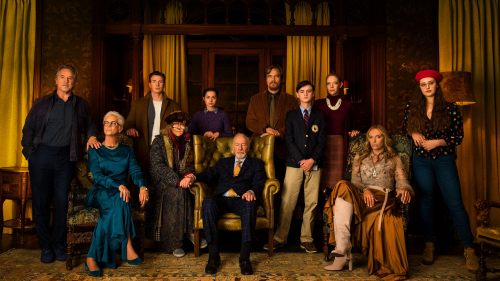MARSHALL Review: This Classic Courtroom Drama’s Something Of A Mixed Bag
Warning: This review contains spoilers for the movie Marshall.
The year is 1941, and a young Thurgood Marshall is rolling into Bridgeport, Connecticut for his latest case like a very handsome (thanks to Chadwick Boseman) NAACP-sent Mary Poppins. It’d be another decade or so before he took on Brown vs. the Board of Education, but he’s already argued before the US Supreme Court. He’s confident and cocky, proud and flagrant about taking up the space that he deserves, and it’s clearly merited; when he goes before the judge to begin arguing the case, he’s the most qualified person in the room by a mile.
Which doesn’t matter to the white judge, who tells him he’s not allowed to speak, argue, or examine witnesses. That now falls, instead, to Sam Friedman (Josh Gad), a young Jewish lawyer who’s never tried a criminal case. The movie doesn’t really click into place until this moment, when you realize that Marshall is going to have to Cyrano-de-Bergerac Friedman into successfully defending Joseph Spell, (Sterling K. Brown) the accused (The film goes for a more Biblical reference – like Aaron for Moses, “he shall speak for you to the people.”)
Here’s the case in question: Eleanor Strubing, a Connecticut housewife (Kate Hudson) has accused her driver, Spell, of raping her, tying her up in the car, and throwing her over a bridge into a reservoir.
This movie can’t rightfully be called a biopic; it’s a classic courtroom drama, focusing in on a singular case. It’s a smart move when you have so much ground to cover in the life of someone as outstanding as Thurgood Marshall, but because of this (and despite the title), he isn’t really the protagonist of this movie. He grounds it, but the case is front and center here, not him.
The film leans heavily into the vibe of its era, which doesn’t always work – it occasionally comes off as a little too costumey – but it’s hard for your heart not to swell a little bit when you see shots of a dashing Marshall in a hat lighting a cigarette as a train pulls into a 1940s station, smoke billowing and jazz piano playing in the background. Marshall takes advantage of the fun of a period film even with such a serious case in the foreground, and it’s refreshing to see a film set in this era that hasn’t been whitewashed. Marshall and his wife meet up with Langston Hughes and Zora Neale Hurston in New York; we see Sam and his family at temple.
The black-Jewish solidarity between Marshall and Friedman ensures that both become targets for white supremacist hate over the course of the film; when they approach the courtyards, a man holds a sign with the words “birds of a feather” written on it. Friedman shies away from this connection at first, but not as the case continues. “You’re one of us now, Sam. Haven’t you noticed?” Marshall tells him. And when the prosecutor (Dan Stevens) tries to throw it in his face at the end, a nonplussed Friedman takes it as a complement.
Watching these two men face insults from white supremacists was something I wish didn’t feel so deeply relevant today. When Marshall, on the steps of the courthouse, speaks out against white supremacy, it felt so modern and so old at the same time. We’ve come a long way in 75 years, but we haven’t come far enough.
As the case progresses, the truth comes out: Joseph Spell lied about what happened that night, but so did Eleanor Strubing. Spell admits that the two had consensual sex, but Mrs. Strubing, scared of societal pressure and especially of her abusive husband, panicked and jumped into the reservoir herself, throwing the blame onto Joseph with full awareness of the consequences that he’d face.
“Eleanor Strubing’s story is nothing less than tragic.” That’s what Marshall tells Friedman to say to the all-white jury, and it’s an angle that makes sense in convincing them of Spell’s own innocence; still painting the white woman as a victim (but of her husband, not Spell) plays to the sympathies of the jury.
Here’s the problem: the movie, with a shot of a wobbly-faced Mrs. Strubing, lands here, too. The arc of the film paints her as a sympathetic figure – and that makes me sick to my stomach. While Eleanor Strubing was a victim at her husband’s hands, she turned that abuse brutally and intentionally onto Joseph Spell. She made the choice to leverage her own whiteness to falsely accuse and victimize an innocent black man. And I want to be as clear as I can, here – the lies of a white woman are a weapon, forged centuries ago but still very much in use today.
I’m writing this on the tail end of a week where the curtain has been pulled back on the toxic nature of Hollywood’s most disgusting men. It makes me angry, and sad, and then angry again. Sexual assault is real, and pervasive, and ignored, and so a story about a false rape accusation can be tricky, maybe even perceived as lending to the narrative that women on the whole will lie about sexual assault (even though statistically, overwhelmingly, we don’t). But this is where intersectionality is so important, because white women have used this lie against black men throughout the history of our country. More often than not, rape accusations are true. But when they are falsified by white women against black men, they become a weapon of racial injustice and white supremacy.
That Mrs. Strubing would feel fear at cheating on her abusive husband with a black man in 1941 is understandable; that she would lie, and continue to stand by her lie when that man’s life is at stake, is unconscionable.
All that said: Marshall is well-plotted, well-acted, and still relevant to our America. At its center is a man who’s invested in doing good, bringing justice, and demanding a better country for himself and the people around him. And that’s all we can try to be right now, too.



